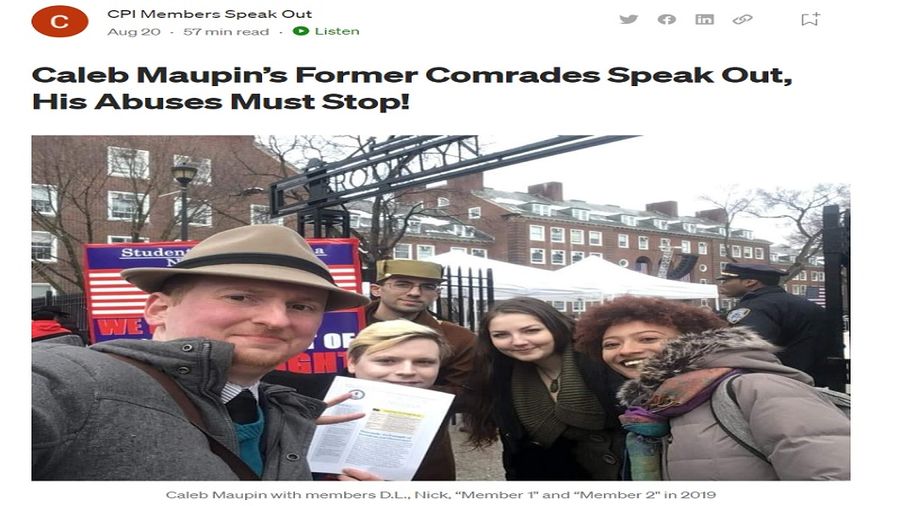The Lessons to be Learned from the Scandalous Claims Against Caleb Maupin
He remains innocent until proven guilty, but this scandal still carries with it some significant lessons to be learned.
Former RT journalist, renowned patriotic socialist pioneer, and founder of the Center of Political Innovation (CPI) Caleb Maupin was just accused of abuse by several of his former colleagues. In the blog post titled “Caleb Maupin’s Former Comrades Speak Out, His Abuses Must Stop!”, they made multiple and detailed allegations against him that many readers are convinced must be taken very seriously. He remains innocent until proven guilty, but this scandal still carries with it some significant lessons to be learned.
First, Maupin is a well-known activist, journalist, and theorist who’s come under tremendous pressure from his political enemies, which include ideologically driven trolls and even the US government that coerced his former employer into shuttering its operations. There’s no doubt that someone as prominent as he is will become the target of character assassinations, hence why some of his supporters suspect that the allegations have no truth to them but are instead part of a plot to discredit and silence him for his work. The lesson here is that a growing role carries with it a growing risk of such a scenario.
Second, the allegations were made by several of his former colleagues who nobody doubts that he was at one point very close with. They aren’t random folks who came forward years after the fact like is the emerging trend in such scandals. Reaffirming that he remains innocent until proven guilty, this nevertheless suggests a degree of credence that has yet to be objectively established. At the very least, the relations that he had with his subordinates influenced them to publicly condemn him, which shows that sometimes the greatest threat comes from within one’s own circle and not outside of it.
Third, some of his former colleagues who made their allegations against him can be described as socially marginalized, which predisposes them to certain behaviors and mentalities that amplify the chances that they’ll engage in risky decisions like drug use and prostitution. This observation is in no way meant to discredit their claims but simply to point out that recruiting such folks into one’s movement is also risky in and of itself even if he ultimately only had sincere intentions to help them improve their lives. Whether he exploited this or not is the question that remains to be answered and might never fully be.
Fourth, Maupin is being accused of manipulating members of the CPI through the employment of cultish tactics. He’s known to have an academic interest in this subject and is the leading force behind his movement, hence why some suspect that these claims have a degree of credence to them. The lesson here is that those groups that disproportionately depend on a single individual like his does are disproportionately susceptible to such accusations since the optics of their prominent leadership role can be spun to suggest that they’re secretly striving to build a cult with all that entails.
And fifth, the gist of the allegations against him is that he at the very least inappropriately mixed his professional and personal (including sexual) lives. The speculative status of his marriage and sexual proclivities are irrelevant since the point is that this alleged behavior almost always inevitably ends in trouble since it creates the context within which such scandals can easily arise irrespective of the truth. Had Maupin not mixed his two lives, it’s very likely that none of this would have happened, but he seemingly struggled with this and the result is now self-evident.
Altogether, the scandalous claims against CPI’s founder are personal in nature and shouldn’t be exploited to discredit his political work, though it’s predicted that his enemies will take advantage of the alleged abuse that he committed in order to smear anyone who supports his movement by association Those who engage in such unethical attacks are simultaneously disrespecting the alleged victims as well as discrediting themselves and everything that they claim to stand for. Finally, aspiring political leaders should learn from the five lessons that were described in order to avoid similar such scandals.







